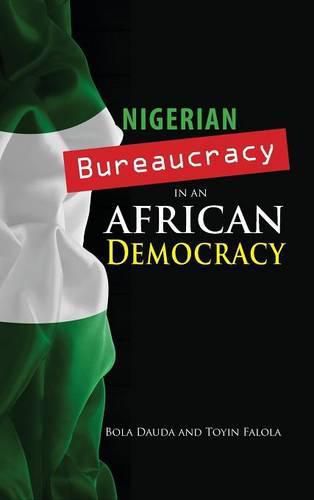Nigerian Bureaucracy in an African Democracy
Bola Dauda (Independent Scholar UK),Toyin Falola (University of Texas at Austin USA)

Nigerian Bureaucracy in an African Democracy
Bola Dauda (Independent Scholar UK),Toyin Falola (University of Texas at Austin USA)
This title is printed to order. This book may have been self-published. If so, we cannot guarantee the quality of the content. In the main most books will have gone through the editing process however some may not. We therefore suggest that you be aware of this before ordering this book. If in doubt check either the author or publisher’s details as we are unable to accept any returns unless they are faulty. Please contact us if you have any questions.
Although Nigeria adopted the American presidential system in 1979, bureaucracy-democracy relations continue to be shrouded with seven fundamental historical issues that are unique to Nigeria. These issues are its colonial heritage, the prevalent diarchy of the civil and the military bureaucracies for more than half of the 50 years of Nigerian independence, the inherited British Westminster parliamentary traditional dichotomy between politics and administration, the inherent powerful nature of bureaucracy, the threat to Nigerian nationhood, intractable challenge of the Nigerian multiethnic nationalities competing for resources, and the double-edged sword of bureaucracy .
In any attempt to understand the complexity of bureaucracy-democracy relations, three things need to be kept in mind. First, there is a misconception that the Nigerian bureaucracy is too powerful for democracy. Second, there is a misunderstanding of the instrumental role of bureaucracy for governance. By political and economic standards, Nigeria is a weak state. Its political stability is often threatened by the centrifugal forces of ethnicity, religion, class, gender, and North-South power relations. However, there is no amount of administrative competence and organizational capability that can remedy political errors, although innocent public administrators will be blamed and will be expected miraculously to produce good out of bad, and success out of unavoidable failure. Bureaucracy cannot substitute for systemic political or institutional socioeconomic cultural and structural public policy defects. Third, political and economic institutions of government can rarely succeed without an appropriate bureaucracy. Therefore, political leaders must demand better administrative performance, constantly monitor that honest attempts are being made to meet their wishes, and exercise effective sanctions when necessary.
This interdisciplinary and comparative study examines the Nigerian political system as a template for a historical and contemporary global comparative review and understanding of democracy-bureaucracy relations.
This item is not currently in-stock. It can be ordered online and is expected to ship in 7-14 days
Our stock data is updated periodically, and availability may change throughout the day for in-demand items. Please call the relevant shop for the most current stock information. Prices are subject to change without notice.
Sign in or become a Readings Member to add this title to a wishlist.


